Cartoon Saloon: A Dream of Irish Animation
 Wednesday, December 16, 2020 at 8:09PM
Wednesday, December 16, 2020 at 8:09PM 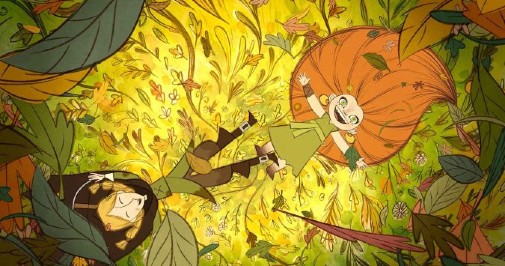
In the past decade, Cartoon Saloon has managed to become one of the most important studios of western animation. It all started back in 2009 when the Belgian-French-Irish co-production The Secret of Kells premiered at the Gérardmer Film Festival. That medieval fantasy went on to conquer a surprising, though amply deserved, Academy Award nomination, as have all the studios' subsequent features – 2014's Song of the Sea, 2017's The Breadwinner, and this year's Wolfwalkers.
With that last picture upon us, it feels like an appropriate time to recall the short history of this splendid studio...
Cartoon Saloon's films construct a conceptual through-line and, in the case of the three directed by Tomm Moore, a thematic trilogy about Irish folklore. Theirs is a cinema of dreams and ancient rituals, magical creatures, and the eternal power of storytelling
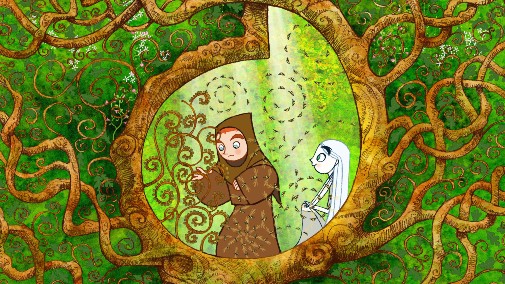
When watching The Secret of Kells, one gets the sense of coming upon something completely new in the history of cinema. Taking its cues from the 9th century Book of Kells, the film is a mix of Celtic design, Medieval Illumination, and hand-drawn digital animation. In this age, so fixated on the tridimensional possibilities of computerized cartoons, Moore's feature is defiantly bi-dimensional, a celebration of unnatural perspective and colorful worlds flattened into illustrations in motion. Who knew one could produce such ravishment with TVPaint Animation?
It's not simply a matter of unmotivated visual splendor, one must say. As the title suggests, The Secret of Kells concerns the creation of the eponymous book, fictionalizing its origins through a story of human progress coming face to face with the natural world, religious modernity clashing with folkloric mythos, children in conflict with their parental figures. It's only logical that the work of art at the center of the story defines the presentation's look, conjuring a motion picture of overwhelming beauty.
A medievalist delight, the narrative is no less sophisticated or emotionally clear because of its visual intricacy. In some ways, it works like a fairy-tale version of history, a story not so different from European legends in its structure and communication, guiding characters through an adventure that's as rich in wonder as in sorrow. Still, if I were to rank the Cartoon Saloon features, I'd have to point at The Secret of Kells as its weakest script, regardless of its imagetic majesty.
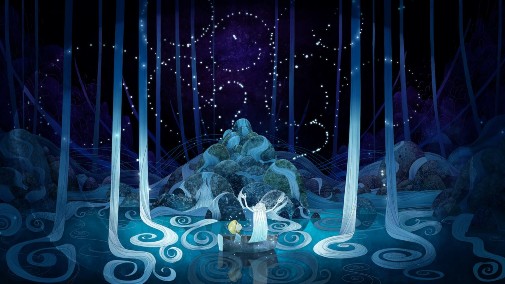
Song of the Sea follows the same aesthetic seen in The Secret of Kells, though it brings Cartoon Saloon nearer to our present age, presenting an Ireland where the nymphic magic of the previous film's forests has been nearly forgotten. The picture starts with a child losing his mother in the same night he gains a sister and, from then on, conjures a narrative of mirrored events and symmetrical character beats. There's no place for ancient enchantments in our reality, though the act of telling stories still gives immortality to those otherworldly wonders.
By the end, Cartoon Saloon has invited us into a Ghibli-like universe where there are no villains and no seamless happy endings, only people trying to do their best and hurting others in the process. I confess I cried quite a bit at this picture's conclusion, its visions of fraternal devotion reverberating through me, and my fond memories of growing up with sisters, both older and younger. As for the animation itself, the movie's a thing of beauty, painting the world in chalky background lines and aquatic tonalities.
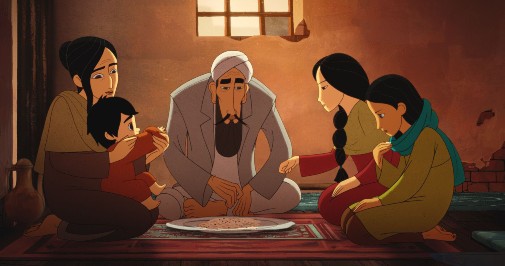
Their third feature was a bit of a departure. This work of director Nora Twomey switches the setting from a green mystical Ireland to the arid severity of Kabul in the 1990s. However, The Breadwinner's themes are familiar to those who've watched the rest of the studio's output. The role of storytelling, its transformative powers, and the old tradition of folklore are given a Middle Eastern twist, seen through the eyes of a girl trying to survive through hardship by pretending to be a boy. There's a lot of moral complexity in the yarn, though the visuals are less awe-inspiring than in the studio's Irish fantasies.
That's not to say there's no splendor to enjoy. The austereness of the imagery is justified by the setting, by the game of contrasts the filmmakers are conceiving. The mundane world may be relatively drab, but that only makes the intromission of other styles more impacting. The protagonist tells stories, morsels of escapism, tools to confront the world's ugliness. In those storytelling moments, the whole movie gains new life, new courage, magic in papery figures, frenetic storms of color.
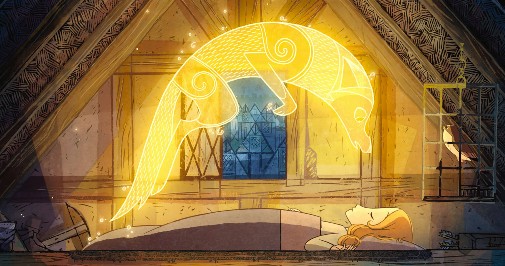
In many ways, Wolfwalkers is the culmination of all the aspects of their previous films, an apotheosis of style and thematic concerns. It's also the start of a new phase in the studio's formalistic maturation. There is a myriad of animated marvels to gush over. One thinks of the ghostly pencil lines around the wild characters, split-screens, wolfish POVs, a jolly marriage of rigid flat backgrounds with riotous motion, how architectural rigidity and jagged tree stumps contrast with the brutality of bloodshed, the liberty of falling leaves, of running animals.
Better yet, the story is as splendid as the animation, matching The Secret of Kells' sheer beauty and besting it in terms of text. It's a story of religious fundamentalism carving away at the natural world, modernity burning a path through the wilderness and killing the ancient lore of the land. It's the story of a daughter trying to understand her father, of a girl trying to save her mother, of a country being forever changed until the grand freedoms of its past live only in the tales told across generations, in the folkloric tradition that so heavily informs the movie's design.
Words cannot describe how much I love Wolfwalkers, a masterpiece of animation that's surely going to nab Cartoon Saloon another Oscar nomination. In my ideal world, it would also win them the trophy, though it's always hard to get AMPAS to look away from the House of Mouse and its affiliates. At the 93rd Academy Awards, I suspect the Best Animated Feature race will come down to a battle between Cartoon Saloon's Wolfwalkers and Pixar's Soul. I'm on the side of the Irish lasses and their sharp-toothed friends.
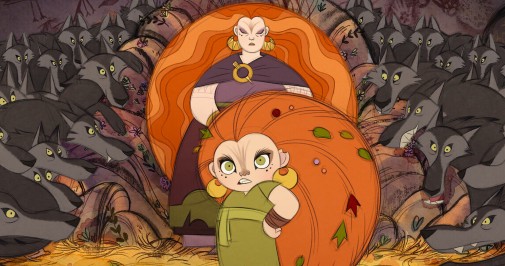
Wolfwalkers is now streaming on Apple TV+. You can find The Secret of Kells on Hoopla and Kanopy, while Song of the Sea and The Breadwinner are both available on Netflix.



Reader Comments (4)
Ha, I just saw Wolfwalkers today and I loved it, too. I don't think the writing is *quite* as strong as the visuals, but I still got all teary-eyed by the end so it clearly worked on a gut level. And yes, it's a simply gorgeous piece of animation that should definitely get Cartoon Saloon another well deserved Oscar nod.
Many years ago my old friend Professor Hamish Henderson collected ancient stories and songs from the travelling people of Scotland, who were the keepers of that art through the oral tradition. He called their art the carrying stream and said to collect it was like holding a cup under a waterfall. I hope cartoon saloon are only just getting going there is so much to tell from our ancient past up here on the edge of the world.
Those screen grabs are all gorgous.
Pádraig O'Neill -- That's beautiful. Thanks for sharing and for your wonderful words.